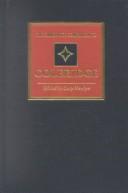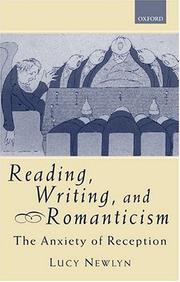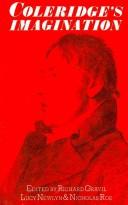| Listing 1 - 4 of 4 |
Sort by
|

ISBN: 0521650712 0521659094 0511999356 1139815989 9780521659093 9780521650717 9780511999352 Year: 2002 Volume: *65 Publisher: Cambridge Cambridge University Press
Abstract | Keywords | Export | Availability | Bookmark
 Loading...
Loading...Choose an application
- Reference Manager
- EndNote
- RefWorks (Direct export to RefWorks)
Samuel Taylor Coleridge is one of the most influential, as well as one of the most enigmatic, of all Romantic figures. The possessor of a precocious talent, he dazzled contemporaries with his poetry, journalism, philosophy and oratory without ever quite living up to his early promise, or overcoming problems of dependence and drug addiction. The Cambridge Companion to Coleridge does full justice to the many facets of Coleridge's life and work. Specially commissioned essays focus on his major poems, including The Rime of the Ancient Mariner and Christabel, his notebooks, and his major work of non-fiction the Biographia Literaria. Attention is given to his role as talker, journalist, critic, and philosopher, his politics, his religion, and his reputation in his own times and afterwards. A chronology and guides to further reading complete the volume, making this an indispensable guide to Coleridge and his work.
Coleridge, Samuel Taylor, --- Coleridge, S. T. --- Kolʹridzh, Samuil, --- Кольридж, Самуил, --- Kolʹridzh, Samuil Teĭlor, --- Кольридж, Самуил Тейлор, --- Kūlīridzh, Ṣāmwīl Tīlūr, --- קולרידג׳, סמיואל טיילור --- Kūlīridj, Ṣāmwīl Tīlūr, --- كولردج، صمويل تيلور, --- קאָלרידש, ס. ט., --- Criticism and interpretation --- Coleridge, Samuel Taylor --- Handbooks, manuals, etc. --- English --- English Literature --- Languages & Literatures --- 820 "18" --- 820 "18" Engelse literatuur--19e eeuw. Periode 1800-1899 --- Engelse literatuur--19e eeuw. Periode 1800-1899 --- COLERIDGE (SAMUEL TAYLOR), 1772-1834 --- CRITIQUE ET INTERPRETATION

ISBN: 0198187106 Year: 2000 Publisher: Oxford [etc.] : Oxford University Press,
Abstract | Keywords | Export | Availability | Bookmark
 Loading...
Loading...Choose an application
- Reference Manager
- EndNote
- RefWorks (Direct export to RefWorks)
Anxiety in literature. --- Authors and readers --- Authorship --- Canon (Literature) --- English poetry --- Reader-response criticism --- Romanticism --- History. --- Psychological aspects. --- History and criticism. --- Canon (Literature).

ISBN: 0511659326 0521303028 0521033993 Year: 1985 Publisher: Cambridge : Cambridge University Press,
Abstract | Keywords | Export | Availability | Bookmark
 Loading...
Loading...Choose an application
- Reference Manager
- EndNote
- RefWorks (Direct export to RefWorks)
The unifying thrust of the book is an exploration of the tension in Coleridge's theory and practice between the Imagination and the Natural, and a delineation of the particular profile of Coleridge's imagination as compared to that of Wordsworth. There are challenging reassessments of Dejection: an Ode, Christabel and Kubla Khan, among other poems; a cluster of essays on the relations between Coleridge and Wordsworth; a strikingly original examination of Coleridge's imagination at work in the privacy of his notebooks; and an intriguing study of the neglected imagination of Mrs Coleridge. The volume opens and closes with major statements by Jonathan Wordsworth on Coleridge's primary imagination and by John Beer on Kubla Khan, and includes work by such eminent scholars as Thomas MacFarland, David Erdman, Norman Fruman, Robert Barth, Anthony Harding, and Stephen Parrish.
English poetry --- History and criticism. --- Coleridge, Samuel Taylor, --- Coleridge, S. T. --- Kolʹridzh, Samuil, --- Кольридж, Самуил, --- Kolʹridzh, Samuil Teĭlor, --- Кольридж, Самуил Тейлор, --- Kūlīridzh, Ṣāmwīl Tīlūr, --- קולרידג׳, סמיואל טיילור --- Kūlīridj, Ṣāmwīl Tīlūr, --- كولردج، صمويل تيلور, --- קאָלרידש, ס. ט., --- Criticism and interpretation. --- Imagination. --- Laver, Pete, --- Imagery, Mental --- Images, Mental --- Mental imagery --- Mental images --- Educational psychology --- Intellect --- Psychology --- Reproduction (Psychology) --- Arts and Humanities --- Literature
Book

ISBN: 9780199586950 9780199558261 9780199588114 9780198784340 9780198738633 Year: 2011 Publisher: Oxford : Oxford University Press,
Abstract | Keywords | Export | Availability | Bookmark
 Loading...
Loading...Choose an application
- Reference Manager
- EndNote
- RefWorks (Direct export to RefWorks)
Edward Thomas can be seen as the most important poetry critic in the early twentieth century. Thomas was a prose-writer before he was a poet. The Selected Edition of his prose, and especially this volume, shows that he was also a critic before he was a poet. His unusual literary career opens up key questions about the relation between poetry and criticism, as well as between poetry and prose. Thomas wrote books about poetry, but his criticism mainly took the form of reviews. He reviewed collections, editions, and studies of poetry, most regularly, for the Daily Chronicle and the Morning Post. These reviews amount to a unique commentary on the state of poetry and of poetry criticism after 1900. Since reviewing provided Thomas's main income, he also reviewed other kinds of book. Hence the sheer mass of his reviews, the stress he suffered as a literary journalist. Yet his criticism maintains an astonishingly high standard. Thomas's response to contemporary poetry intersects with his readings of older poetry. No critic or poet of the time was so deeply acquainted with the traditions of English-language poetry or so alert to new poetic movements in Ireland and America. Edward Thomas's writings on poetry have a double importance. Besides suggesting the hidden evolution of his own aesthetic, they constitute a lost history and critique of poetry before the Great War. They change our assumptions about that period. Thomas's perspectives on poets such as Yeats, Hardy, Frost, Lawrence, and Pound illuminate the making of modern poetry. Autobiographies is the first volume in Edward Thomas: Prose Writings: A Selected Edition. It contains the autobiographical prose of one of the most respected British writers of the twentieth century, including the autobiographical story The Happy-Go-Lucky Morgans, the posthumously published 'autobiography' The Childhood of Edward Thomas, the essay 'How I Began', the previously unpublished 'Addenda to Autobiography', and a long section from 'Fiction' (also previously unpublished). In these works, all written between 1912 and 1914, Thomas provides a remarkable portrait of his childhood and teenage years in London, Wiltshire, and Wales. Writing this prose was a journey away from a troubled present back into earlier and happier experiences, but these unique autobiographies also have much in common with his other prose works. The complexity and brilliance of Thomas's autobiographical prose is discussed and revealed in a long introduction, by a detailed headnote at the start of each work, and by extensive annotation. Thomas's prose has never previously been given the scholarly attention that it receives here. Although Thomas's autobiographies are very accessible, and written with a longing for the simplicity of childhood, they are also intricately woven, using many quotations and allusions. The longest of the works, The Happy-Go-Lucky Morgans, is both his simplest prose work and his most complex. Indeed, Autobiographies contains some of Thomas's finest prose, written in the two years, and in some cases merely a few months, before his decision to start writing the poetry for which he is most, and greatly, esteemed. Edward Thomas: Prose Writings: A Selected Edition will appeal to those who know and admire his prose, as well as those who have never encountered it before, and show that Thomas's prose, not least his autobiographical prose, deserves to be much better known. The second volume contains Thomas's writings on England and Wales, and is mostly concerned with his response to the countryside. It covers the entirety of his writing career, showing the development of his identity and style. Works appear in chronological order within the volume, which begins with acomprehensive introduction, providing biographical details, an account of the circumstances of composition, historical contextualisation of the volume's themes and concerns, and an interpretation based on original research. Thomas's complex and brilliant prose, intricately woven using manyquotations and allusions, is elucidated by a detailed headnote at the start of each work, and by extensive annotation. The third volume provides the annotated texts of two biographies by Thomas: Richard Jefferies: His Life and Work (1909) and George Borrow: The Man and His Books (1912). A detailed introduction addresses a range of matters relating to the subjects of these two biographies as well as to Thomas's approach to them. Among the topics discussed in relation to Jefferies are: the correspondences between Jefferies' life and Thomas's; the influence of Jefferies on Thomas's thought and writing, including such matters as mystical experience and the passage of time; Thomas's unwarranted anxieties about the quality of the biography; and the high standing of the biography in the century since its publication. Among the topics discussed in relation to Borrow are: Thomas's ambivalence towards his subject; the influence of Borrow on later attitudes to walking and the open air, particularly as these were expressed in literature; the popular and literary interest (again attributable in part to Borrow's influence) in Romani life; and the way in which Thomas's approach to the Borrow biography, with its emphasis on the value of impressions as distinct from facts, chimes with Modernist thinking about the nature of narrative. The edition's extensive notes provide further insights into the texts and their cultural context. Volume V is dedicated to Edward Thomas's work in literary criticism. Known as a diverse and prolific reviewer of literature, including of modern poetry, Thomas also wrote a significant number of broadly critical studies at book length. These books helped alter his established reputation as a nature writer, and included studies of Lefcadio Hearn, Maurice Maeterlinck, and of Keats. Volume 5 reproduces the two most important of his works in criticism: Thomas's Algernon Charles Swinburne: A Study (1912) and Walter Pater: A Study (1913). These are important texts in the last few years of Thomas's career as a prose writer, in which obliquely he assesses his own relationship with prose and with creative language, analysing via two other writers what were some of the largest challenges for his authorship. Presented as an evaluation of two major Victorian writers, the two books are best understood as self-examination. And they are also, as the Introduction argues, telling versions of Thomas's 'unlived lives': in assessing both Swinburne and Pater, Thomas contemplates lives that he had not himself led. The books are suffused with his own dismay, self-criticism, longing, and desire. They are unmissable steps on Thomas the poet's way to discovering that prose was not the best literary form for his self-expression. Fully annotated, this edition draws widely on the surviving manuscripts of these two works to present a unique insight into Thomas at work, finding the physical traces in the manuscript record of the very troubles he was claiming true of two other writers. The edition also adds further literary material, including reviews and an early Paterian short-story by Thomas to indicate something of his debts -- sometimes despite his protestations -- to authors of the previous generation.
Thomas, Edward, --- Jefferies, Richard, --- Borrow, George, --- Swinburne, Algernon Charles, --- Pater, Walter,
| Listing 1 - 4 of 4 |
Sort by
|

 Search
Search Feedback
Feedback About UniCat
About UniCat  Help
Help News
News